

Energy policy acceptability UK 2013. Women and sustainable energy: research examines roles, seeks to help bridge gender gap. Active Participation of Women Essential to the Global Energy Transformation. By 2050, IRENA projects that there will be around 40 million jobs directly related to renewable energy and energy efficiency worldwide, a more than four-fold increase from today.
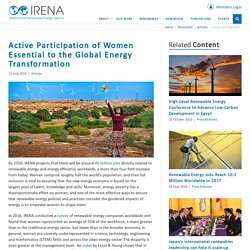
Women comprise roughly half the world’s population, and their full inclusion is vital to ensuring that the new energy economy is based on the largest pool of talent, knowledge and skills. Moreover, energy poverty has a disproportionate effect on women, and one of the most effective ways to ensure that renewable energy policies and practices consider the gendered impacts of energy is to empower women to shape them. In 2016, IRENA conducted a survey of renewable energy companies worldwide and found that women represented an average of 35% of the workforce, a share greater than in the traditional energy sector, but lower than in the broader economy.
In general, women are severely underrepresented in science, technology, engineering and mathematics (STEM) fields and across the clean energy sector. Ms. The rise of the quasi-public space and its consequences for cities and culture. A new phenomenon is emerging in London: quasi-public spaces.
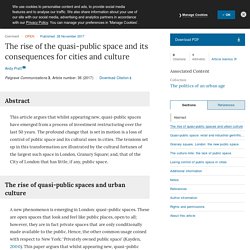
Wealthier people do less in the struggle against climate change – URV Activ@ A collective-risk dilemma experiment with members of the public in Barcelona has shown that people are more or less likely to contribute money to fighting climate change depending on their how wealthy they are.
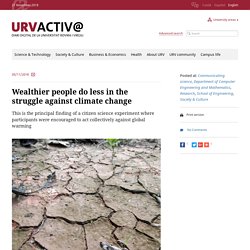
And the results indicate that participants with fewer resources were prepared to contribute significantly more to the public good than wealthier people, sometimes up to twice as much. These are the principal findings of a study published in the journal PLOS ONE by researchers from the Universitat Rovira i Virgili, the University of Barcelona, the University of Zaragoza and the Carlos III University of Madrid, who measured how a group of individuals acted in the face of a common threat.
Study: Climate change could force outdoor workers to wake up far earlier. A new study published in Earth's Future, a journal of the American Geophysical Union, indicates that if society tries to avoid the economic impacts of climate change on outdoor labor by shifting working hours, outdoor workers in many regions will need to start working well before dawn at the end of this century to avoid the effect of excessive heat stress.
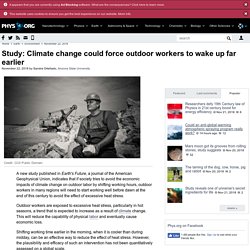
Outdoor workers are exposed to excessive heat stress, particularly in hot seasons, a trend that is expected to increase as a result of climate change. This will reduce the capability of physical labor and eventually cause economic loss. Regeneration may cause isolation for older people, study finds. A study by an academic from The University of Manchester has found that urban regeneration in poor neighbourhoods can actually backfire, and lead to older people feeling isolated.
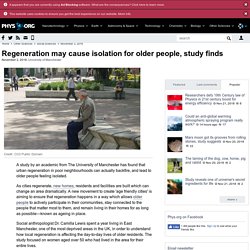
Cooling off effect causes public perception novel environmental technology improve over time 503na3 en. I Need Plastic Straws To Drink. I Also Want To Save The Environment. Sent packing: Hong Kong's elderly cardboard collectors - Environment. Her fingers are bent from 20 years of collecting cardboard from Hong Kong's streets, but Au Fung-lan says she has no desire to give up the gruelling work.

At 67-years-old she is one of around 2,900 collectors, mainly women over the age of 60, whose frail figures are a familiar sight, guiding trolleys loaded with cardboard through a city clogged with traffic and people. They pick up discarded packing boxes from shops, markets and residential buildings, selling them for a few dollars to recycling depots, where cardboard is more valuable than plastic. The depots then ship it abroad -- up to 95 percent of it to mainland China in 2016, according to local authorities -- as Hong Kong has no recycling plants of its own to convert it into usable materials.
However, as China closes the door to imported rubbish, even from semi-autonomous regions such as Hong Kong, Au's livelihood is under threat. ‘Disabled people care about the environment’: Include us in the plastic straw debate says the disability community. Cities have banned them, the UK is considering a country-wide ban while supermarkets and bars world-wide are no longer supplying them.
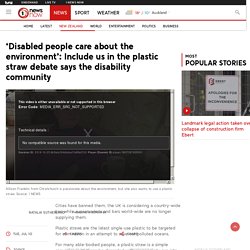
Pre-packaged food ‘vital’ for some disabled people. Yes, the Environmental Movement Sometimes Discriminates Against the Disabled. It is a truth universally acknowledged that environmentalism faces many enormous barriers, some of which are fundamental aspects of modern society, while some of which are entirely avoidable.

Discrimination against the disabled community in environmental motions most definitely falls into the latter category. The straw ban might be great for the environment but not for disabled people. Drought: A cause of riots. The scientific community has been working on the possibility of a relationship between periods of drought and rioting for several years.
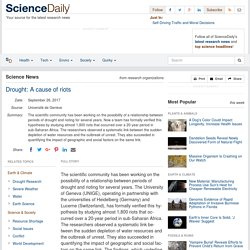
Aside from Damaging Our Health, Smoking Also Harms the Environment. The tobacco industry’s carbon footprint is greater than that of entire countries, such as Israel or Peru.

Tobacco’s disastrous effects on human health have been clear for decades, despite industry giants trying to hide the evidence linking cigarette smoke and disease for as long as possible. Despite Big Tobacco’s machinations, countless public awareness campaigns have exposed the drug’s role in causing lung cancer and numerous other serious conditions. Legislation around the world has slowly chipped away at the once-dominant addiction: Smoking prevalence has decreased by more than half in some developed countries since 1980 and continues to decline. This progress has substantially contributed to cancer prevention efforts. A new report from the American Cancer Society indicated that the drop in cancer rates over the last three decades can principally be chalked up to tobacco control initiatives. The Root of the Problem. Cost of cigarettes must rise to reflect environmental damage from tobacco industry, WHO says.
The price of a packet of cigarettes should rise to reflect the wide-ranging environmental damage caused by the tobacco industry, from deforestation to water pollution, a major report has recommended. Backed by the World Health Organisation (WHO), the study found the industry’s carbon footprint was comparable to entire countries. Tobacco farms accounted for the loss of around 5 per cent of forests in parts of Asia and Africa, it stated.
The UK was among the countries singled out for criticism along with several other western nations which were condemned for “literally burning poorer countries’ resources”. Cigarette production and consumption have seen dramatic growth in recent decades with around six trillion cigarettes manufactured annually for an estimated one billion smokers. Tobacco control, a ‘major component’ of environmental protection efforts – UN health official. The World Health Organization Framework Convention on Tobacco Control (WHO FCTC), which is celebrating the 15th anniversary of it being adopted this year – is a global health treaty that advocates for the control of tobacco production, sale and use, as a way of reducing tobacco-related illnesses, deaths, environmental degradation and poverty across the world.
“People often immediately think of the health impact that tobacco has, but there is not enough awareness of how tremendously destructive it is for the environment too, on land, under water and in the air,” said Dr. Vera Luiza da Costa e Silva, the Head of the WHO FCTC Secretariat. “Studies indicate that tobacco growing could be up to 10 times more aggressive than all other deforestation factors,” Dr. da Costa e Silva noted. Governments need to understand that tobacco control is a major component of any effective and holistic environmental protection effort - Dr. Menstrual cups make a difference for refugee women. Social impact of green crowdfunding. There is growing interest in crowdfunding as an alternative way to support projects focused on renewables. This comes at a time when the green energy sector is feeling the purse strings tighten in many European countries.
“National governments in the EU are alleged to have created a booming cycle by initially granting strong support for renewables then rapidly rowing back as they feared excessive expenses for subsidies and an increase in the price of electricity for industry”, points out a recent study by researchers from the Politecnico di Milano School of Management, the Università Bocconi, Milan, Italy and the Ton Duc Thang University, Ho Chi Minh City, Vietnam. In the paper, titled “Crowdfunding for green projects in Europe: success factors and effects on the local environmental performance and wellbeing”, they analysed the key factors that made a wide sample of crowdfunding campaigns through specialised platforms successful. Crowdfunding and renewable energy.
What would the ultimate child-friendly city look like? Imagine you are 10 years old. You live in a medium-sized city and want to visit your best friend, a five-minute walk away, so you can go to the park, another 10 minutes’ walk. The problem is, there’s a big, dangerous road between you and your friend, and another between them and the park. You ask your parents if you can walk, they say no, and they are too busy to take you there themselves. Perhaps you SnapChat your friend instead, perhaps you play a video game on the sofa.
What would a truly disabled-accessible city look like? ILO guidelines for a just transition. International Institute for Environment and Development. Early morning in the Indonesian city of Jakarta reveals heavy air pollution, largely caused by its notorious traffic jams (Photo: Aaron Minnick/World Resources Institute, Creative Commons via Flickr) Climate change and social inequality (UN DESA) Heat: the next big inequality issue. We're dangerously unprepared for the heat crisis from climate change (opinion) The Impacts of Climate Change Take a Heavier Toll on Older Women. By G. Climate change and kids: Here's why doctors are worried. Effects of climate change in the workplace: increased occupational risks and a need for action to be taken in the world of work.
The news has been added to your library. Keeping cool in a warming world is not a ‘luxury’ for the rich. The heatwaves currently experienced in Europe should be a wake-up call to stop ignoring summer domestic energy poverty, writes Yamina Saheb. Dr Yamina Saheb is senior energy policy analyst at OpenExp, a Paris-based global network of independent experts working on solutions for sustainable development.
Air con led to quicker thinking during heat wave. American Students Don’t Learn Well When It’s Hot Outside. UK ‘woefully unprepared’ for deadly heatwaves, warn MPs. Is inequality harming the environment? Is Gender Balance Better for the Environment? Envirotech Online. Is inequality bad for the environment? Green gentrification can limit the favorable effects of green areas on health. Environmental racism. Putting community to use in environmental policy making Emerging trends in Scottland and the UK.
Stringer et al 2018 Earth's Future. Green Causes Are Not Always Colorblind: Racial Disparity in Energy Issues. Environment Agency launch campaign to prepare for frequent flooding. Who are green cities actually for. Blythe et al 2018 Antipode. Who bears economic cost of env policy 2017. Accelerating shift to low carbon economy EC 2016. Circular economy EU action plan. EU Action Plan for circular economy 2015. Circular economy EU working paper. ENVIRONMENTAL POLICY AND GROWTH WHEN ENVIRONMENTAL AWARENESS IS ENDOGENOUS. 2018 Book GreenEconomyImplementationInTh. Reinterpreting the gender gap in household pro environmental behaviour. Baby Boomers versus Milennials Kate Alexander Shaw. How Greening Strategies Are Displacing Minorities in Post-Harvey Houston – The Nature of Cities. Gutsy, organised Londoners have learned to stop gentrification in its tracks – here's how. Poll: Children believe older generation not doing enough to combat climate change.